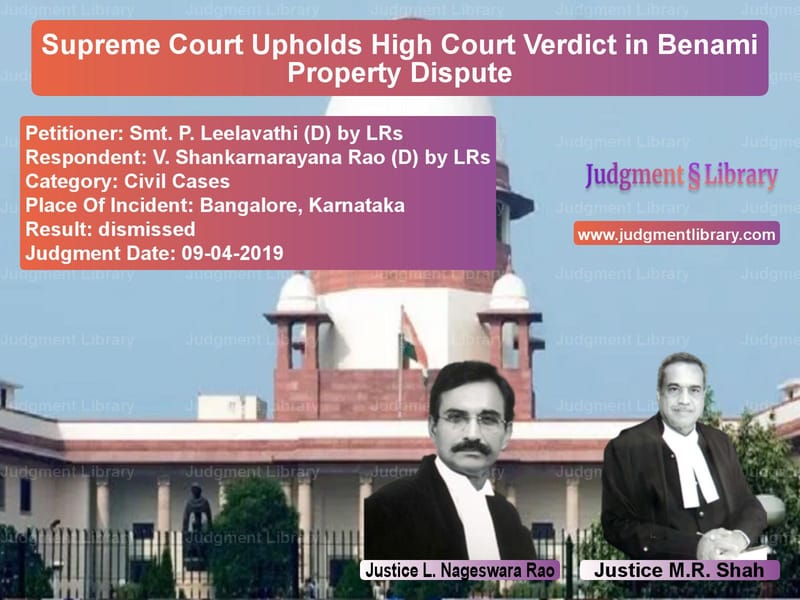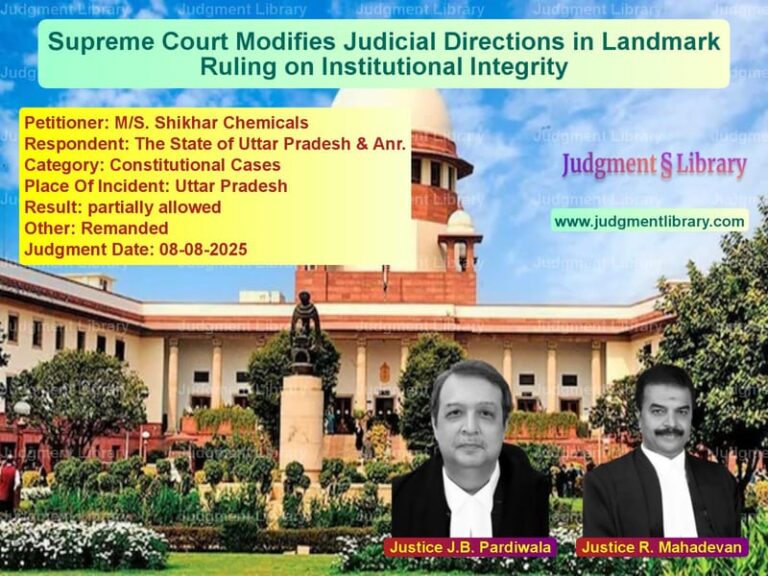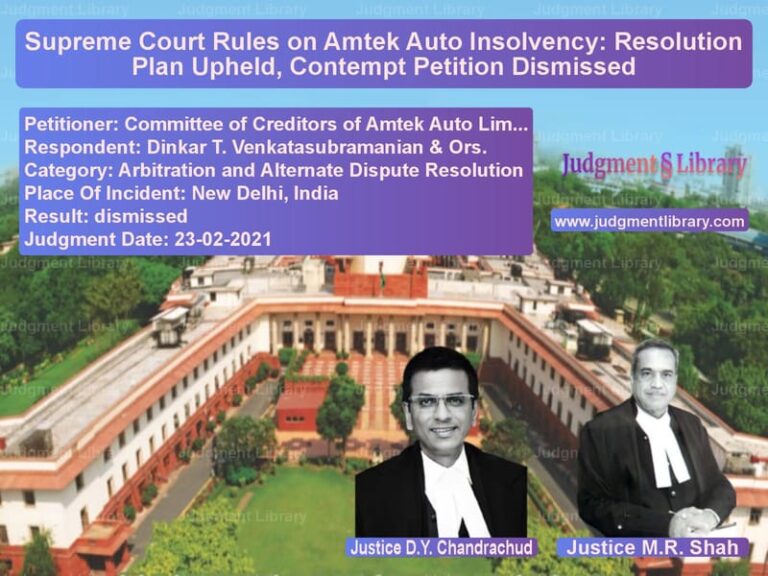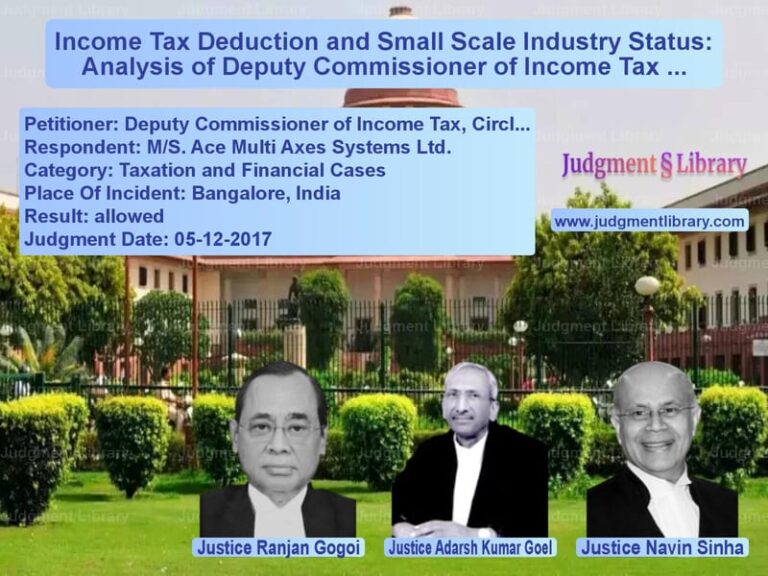Supreme Court Upholds High Court Verdict in Benami Property Dispute
The Supreme Court of India, in the case of Smt. P. Leelavathi (D) by LRs v. V. Shankarnarayana Rao (D) by LRs, upheld the Karnataka High Court’s ruling that the properties in question were not benami and rightfully belonged to the respondents. The Court ruled that the appellant failed to prove that her late father had purchased the disputed properties in the names of her brothers for the benefit of the family.
Background of the Case
The case originated from a property dispute within a family following the death of G. Venkata Rao on October 8, 1974. The appellant, Smt. P. Leelavathi, filed a suit in 1980 for partition and recovery of her 1/4th share in the properties owned by her father.
The appellant contended that:
- Her father, G. Venkata Rao, was an estate agent engaged in money lending.
- He had purchased various properties in the names of his sons, using his own funds.
- The properties were therefore benami in nature, and she was entitled to her rightful share.
Respondents’ Arguments
The respondents (her brothers) denied these claims and argued:
- The properties in question were self-acquired assets and not part of any joint family estate.
- Their father was never financially capable of purchasing properties for them.
- Each of them had acquired their respective properties independently.
Trial Court’s Verdict
The Trial Court ruled against the appellant, stating that she failed to provide conclusive evidence to prove that the properties were benami. It held that:
- The properties were self-acquired by the respondents.
- The appellant had no rightful claim to them.
- Only certain minor movable assets were awarded to the appellant.
High Court’s Ruling
The Karnataka High Court upheld the Trial Court’s decision. It found that the transactions were not benami and:
- The properties were purchased lawfully in the names of the respondents.
- The appellant’s claim lacked legal backing and was based on assumptions rather than proof.
- The properties could not be considered part of a joint family estate.
Supreme Court’s Analysis
The Supreme Court, in its judgment delivered by Justices L. Nageswara Rao and M.R. Shah, examined whether the properties could be considered benami.
1. Legal Principles of Benami Transactions
The Court referred to the Benami Transactions (Prohibition) Act, 1988 and previous judgments, stating:
“The burden of proving that a transaction is benami rests on the person asserting it. The plaintiff failed to discharge this burden.”
2. Source of Funds Not Sole Determinant
The Court emphasized that even if the father provided financial assistance, it does not automatically make a transaction benami.
“Financial assistance alone does not establish a benami transaction unless there is clear evidence of intention.”
3. Conduct of the Parties
The Court noted that the appellant’s father had provided financial assistance to all his children, including the appellant herself.
“The appellant’s father provided financial support to all children, including the plaintiff. The mere act of financial aid does not create a joint family estate.”
4. Burden of Proof
The Court reiterated that the plaintiff failed to provide compelling evidence:
“The plaintiff has failed to establish that the properties were purchased by the father with the intention of creating a joint estate.”
Final Judgment
The Supreme Court dismissed the appeal and upheld the High Court’s ruling:
“The present appeal fails and deserves to be dismissed. The findings of the High Court are affirmed.”
Key Takeaways
- Benami claims require strong proof: Mere financial assistance from a family member does not establish a benami transaction.
- Burden of proof lies with the claimant: The party alleging benami must prove intention and supporting facts.
- Property purchased in one’s name is presumed self-acquired: The default legal position is that property belongs to the person in whose name it is registered.
- Family financial assistance does not create joint ownership: Support to children does not make their properties part of a joint estate.
Conclusion
The Supreme Court’s judgment in Smt. P. Leelavathi (D) by LRs v. V. Shankarnarayana Rao (D) by LRs reaffirms that allegations of benami transactions must be supported by clear and convincing evidence. This decision ensures clarity in property disputes within families and prevents frivolous claims against lawfully owned assets.
Petitioner Name: Smt. P. Leelavathi (D) by LRs.Respondent Name: V. Shankarnarayana Rao (D) by LRs.Judgment By: Justice L. Nageswara Rao, Justice M.R. Shah.Place Of Incident: Bangalore, Karnataka.Judgment Date: 09-04-2019.
Don’t miss out on the full details! Download the complete judgment in PDF format below and gain valuable insights instantly!
Download Judgment: Smt. P. Leelavathi ( vs V. Shankarnarayana R Supreme Court of India Judgment Dated 09-04-2019.pdf
Direct Downlaod Judgment: Direct downlaod this Judgment
See all petitions in Property Disputes
See all petitions in Succession and Wills
See all petitions in Judgment by L. Nageswara Rao
See all petitions in Judgment by Mukeshkumar Rasikbhai Shah
See all petitions in dismissed
See all petitions in supreme court of India judgments April 2019
See all petitions in 2019 judgments
See all posts in Civil Cases Category
See all allowed petitions in Civil Cases Category
See all Dismissed petitions in Civil Cases Category
See all partially allowed petitions in Civil Cases Category







